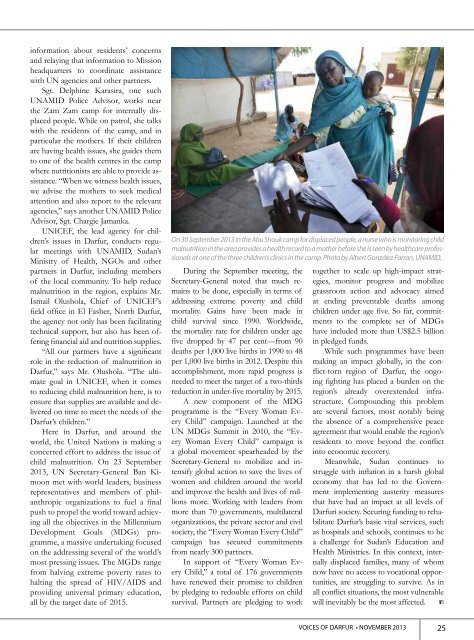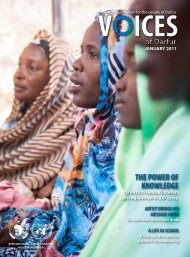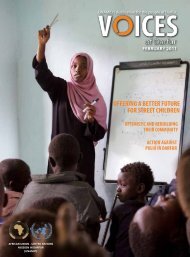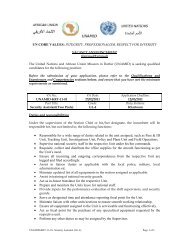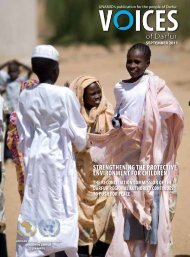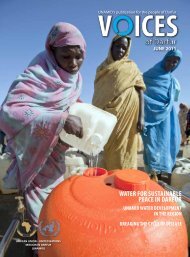Darfur Dances
Download the magazine (PDF) here. - Unamid
Download the magazine (PDF) here. - Unamid
- No tags were found...
Create successful ePaper yourself
Turn your PDF publications into a flip-book with our unique Google optimized e-Paper software.
information about residents’ concerns<br />
and relaying that information to Mission<br />
headquarters to coordinate assistance<br />
with UN agencies and other partners.<br />
Sgt. Delphine Karasira, one such<br />
UNAMID Police Advisor, works near<br />
the Zam Zam camp for internally displaced<br />
people. While on patrol, she talks<br />
with the residents of the camp, and in<br />
particular the mothers. If their children<br />
are having health issues, she guides them<br />
to one of the health centres in the camp<br />
where nutritionists are able to provide assistance.<br />
“When we witness health issues,<br />
we advise the mothers to seek medical<br />
attention and also report to the relevant<br />
agencies,” says another UNAMID Police<br />
Advisor, Sgt. Chargie Jamanka.<br />
UNICEF, the lead agency for children’s<br />
issues in <strong>Darfur</strong>, conducts regular<br />
meetings with UNAMID, Sudan’s<br />
Ministry of Health, NGOs and other<br />
partners in <strong>Darfur</strong>, including members<br />
of the local community. To help reduce<br />
malnutrition in the region, explains Mr.<br />
Ismail Olushola, Chief of UNICEF’s<br />
field office in El Fasher, North <strong>Darfur</strong>,<br />
the agency not only has been facilitating<br />
technical support, but also has been offering<br />
financial aid and nutrition supplies.<br />
“All our partners have a significant<br />
role in the reduction of malnutrition in<br />
<strong>Darfur</strong>,” says Mr. Olushola. “The ultimate<br />
goal in UNICEF, when it comes<br />
to reducing child malnutrition here, is to<br />
ensure that supplies are available and delivered<br />
on time to meet the needs of the<br />
<strong>Darfur</strong>’s children.”<br />
Here in <strong>Darfur</strong>, and around the<br />
world, the United Nations is making a<br />
concerted effort to address the issue of<br />
child malnutrition. On 23 September<br />
2013, UN Secretary-General Ban Kimoon<br />
met with world leaders, business<br />
representatives and members of philanthropic<br />
organizations to fuel a final<br />
push to propel the world toward achieving<br />
all the objectives in the Millennium<br />
Development Goals (MDGs) programme,<br />
a massive undertaking focused<br />
on the addressing several of the world’s<br />
most pressing issues. The MGDs range<br />
from halving extreme poverty rates to<br />
halting the spread of HIV/AIDS and<br />
providing universal primary education,<br />
all by the target date of 2015.<br />
On 30 September 2013 in the Abu Shouk camp for displaced people, a nurse who is monitoring child<br />
malnutrition in the area provides a health record to a mother before she is seen by healthcare professionals<br />
at one of the three children’s clinics in the camp. Photo by Albert González Farran, UNAMID.<br />
During the September meeting, the<br />
Secretary-General noted that much remains<br />
to be done, especially in terms of<br />
addressing extreme poverty and child<br />
mortality. Gains have been made in<br />
child survival since 1990. Worldwide,<br />
the mortality rate for children under age<br />
five dropped by 47 per cent—from 90<br />
deaths per 1,000 live births in 1990 to 48<br />
per 1,000 live births in 2012. Despite this<br />
accomplishment, more rapid progress is<br />
needed to meet the target of a two-thirds<br />
reduction in under-five mortality by 2015.<br />
A new component of the MDG<br />
programme is the “Every Woman Every<br />
Child” campaign. Launched at the<br />
UN MDGs Summit in 2010, the “Every<br />
Woman Every Child” campaign is<br />
a global movement spearheaded by the<br />
Secretary-General to mobilize and intensify<br />
global action to save the lives of<br />
women and children around the world<br />
and improve the health and lives of millions<br />
more. Working with leaders from<br />
more than 70 governments, multilateral<br />
organizations, the private sector and civil<br />
society, the “Every Woman Every Child”<br />
campaign has secured commitments<br />
from nearly 300 partners.<br />
In support of “Every Woman Every<br />
Child,” a total of 176 governments<br />
have renewed their promise to children<br />
by pledging to redouble efforts on child<br />
survival. Partners are pledging to work<br />
together to scale up high-impact strategies,<br />
monitor progress and mobilize<br />
grassroots action and advocacy aimed<br />
at ending preventable deaths among<br />
children under age five. So far, commitments<br />
to the complete set of MDGs<br />
have included more than US$2.5 billion<br />
in pledged funds.<br />
While such programmes have been<br />
making an impact globally, in the conflict-torn<br />
region of <strong>Darfur</strong>, the ongoing<br />
fighting has placed a burden on the<br />
region’s already overextended infrastructure.<br />
Compounding this problem<br />
are several factors, most notably being<br />
the absence of a comprehensive peace<br />
agreement that would enable the region’s<br />
residents to move beyond the conflict<br />
into economic recovery.<br />
Meanwhile, Sudan continues to<br />
struggle with inflation in a harsh global<br />
economy that has led to the Government<br />
implementing austerity measures<br />
that have had an impact at all levels of<br />
<strong>Darfur</strong>i society. Securing funding to rehabilitate<br />
<strong>Darfur</strong>’s basic vital services, such<br />
as hospitals and schools, continues to be<br />
a challenge for Sudan’s Education and<br />
Health Ministries. In this context, internally<br />
displaced families, many of whom<br />
now have no access to vocational opportunities,<br />
are struggling to survive. As in<br />
all conflict situations, the most vulnerable<br />
will inevitably be the most affected. V<br />
VOICES OF DARFUR • NOVEMBER 2013<br />
25


